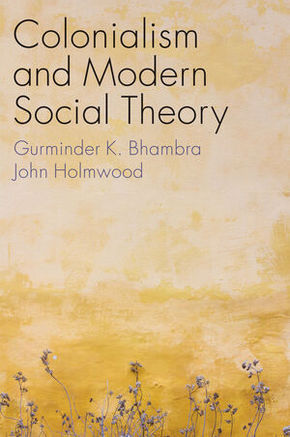
Colonialism and Modern Social Theory
| Verlag | Wiley & Sons |
| Auflage | 2021 |
| Seiten | 272 |
| Format | 15,4 x 2,1 x 22,7 cm |
| Gewicht | 396 g |
| Artikeltyp | Englisches Buch |
| EAN | 9781509541300 |
| Bestell-Nr | 50954130UA |
Modern society emerged in the context of European colonialism and empire. So, too, did a distinctively modern social theory, laying the basis for most social theorising ever since. Yet colonialism and empire are absent from the conceptual understandings of modern society, which are organised instead around ideas of nation state and capitalist economy.
Gurminder K. Bhambra and John Holmwood address this absence by examining the role of colonialism in the development of modern society and the legacies it has bequeathed. Beginning with a consideration of the role of colonialism and empire in the formation of social theory from Hobbes to Hegel, the authors go on to focus on the work of Tocqueville, Marx, Weber, Durkheim and Du Bois. As well as unpicking critical omissions and misrepresentations, the chapters discuss the places where colonialism is acknowledged and discussed - albeit inadequately - by these founding figures; and we come to see what this fresh rereading has to o ffer and why it matters. This inspiring and insightful book argues for a reconstruction of social theory that should lead to a better understanding of contemporary social thought, its limitations, and its wider possibilities.
Inhaltsverzeichnis:
Introduction: Colonialism, Historiography, and Modern Social Theory
1. Hobbes to Hegel: Europe and its Others
2. Tocqueville: From the United States to Algeria
3. Marx: Colonialism, Capitalism, and Class
4. Weber: Religion, Nation, and Empire
5. Durkheim: Modernity and Community
6. Du Bois: Addressing the Colour Line
Conclusion: The Fictions of Modern Social Theory
Rezension:
Click here to watch the online launch of the book.
?This is a remarkably powerful book that supplies an eloquent, well-reasoned, and thorough account of how colonialism and empire are absent from sociology?s current jurisdiction. Written by two outstanding sociologists, it is a nuanced and pertinent critique of the classical canon in modern social theory and an invitation to decolonize it.?
Sari Hanafi, American University of Beirut and President of the International Sociological Association
?Bhambra and Holmwood analyse incisively how the elided colonial context of modern social theory has shaped and limited its purview, and that of western sociology. They provide a timely, provocative optic for engaging the unanticipated ethnoracial nationalist backlash to multicultural democracy.?
Robert J. Antonio, University of Kansas
